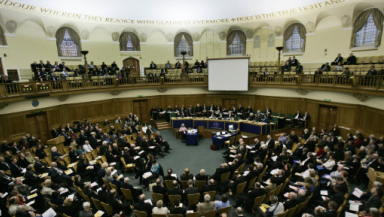
The Church of England General Synod begins today and by all accounts it's likely to be an eventful one. 2013 has already been a big year, since the decision was taken to cancel the usual February Synod. This rare move was made in the wake of the exceptionally close vote on the issue of Women bishops in the November Synod of 2012, where only 2% of the House of Laity stood between broader Anglican gender equality and the status quo. But as is always the case there is more than one issue on the table.
Church Schools: After the so-called "Chadwick Report" – better known as the report into "Church Schools of the Future", it was made clear that the C of E needs to develop a better model for dealing with, not only its own schools, but also its relations with other non-religious schools. Issues to be looked at here are ways in which training for ministry can better incorporate the role the Church plays in schools, as well as the setting up of a single organisation dedicated to representing the Church's interests on matters relating to schools and education.
Evangelism: To many Christians outside the C of E, the idea that an idea as intrinsic to Christianity as evangelism somehow needs to be a specific 'issue' to be discussed in the context of Church government is rather absurd. Surely, this is an issue that is a constant ongoing part of the Church's effort, and something that should be dealt with at a local level? But many in the Church's upper echelons feel that a specific focus from the Synod would give added impetus and zeal to the situation, and thus the Archbishop of York Dr John Sentamu will seek to create a new 'task force' for evangelism, as well as a specific call to prayer for it in June 2014. There are also calls to all individual Parish Church Councils to spend most of at least one meeting annually, as well as some part of every meeting, to focus on "sharing experiences and initiatives for making new disciples".
Reform of the General Synod: The Synod has existed in its current form since 1970. Before that, there was the Church Assembly that began in 1919, and before that the C of E's business was directly controlled by Parliament, meaning that things moved even more slowly than they do now. But many feel that the current General Synod is not only slow moving and complicated (there is a reason tri-cameralism is historically widely eschewed), it is also far too adversarial and parliamentary in its style, with party groups and coalitions formed along theological lines. An official Synod paper has warned that its members are often seen as "rude and poor examples of Christians", which is not to mention the lack of representation of ethnic minorities, other classes, or the young, with two thirds of the House of Laity being over sixty, which is three times that in the overall population. After a scathing review of the situation by the now Bishop of Salisbury in 2010, plans include a reduction of the number of Synod meetings, as well as questions of reforming debate structures, and simplifying the election procedures to ensure they are "fit for purpose".
Women Bishops: This is the issue with the most potential for historic change. It's been thirteen years in the making, with fractious debate and discussion causing the Church many problems in the eyes of the wider world. Although the principle of letting women take up the role of bishops was agreed on in principle in 2005, what has remained difficult to solve is the question of how to accommodate those who disagree. Previous suggestions of a two-tier Church system or some kind of consistent male oversight were not found to be acceptable, but now a proposal to have a kind of internal oversight 'ombudsman' which individual parish churches can complain to has gained ground. The Right Reverend Jonathan Baker, who leads the Anglo Catholic block in the Synod known as Forward in Faith has dropped his objections to legislation proposed by a steering committee set up in the wake of the failure of the vote in 2012. There will no doubt be further debate, but it is looking clear that this final push may be enough to achieve the balance of gender equality and Church unity that has been so keenly sought after for so long.













